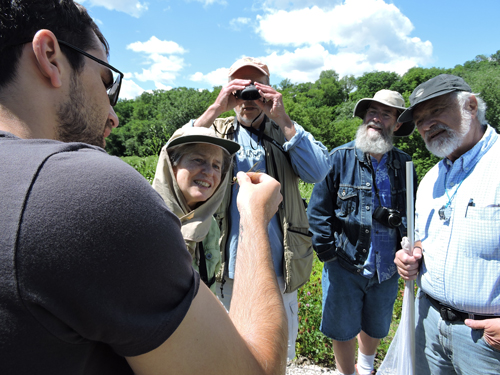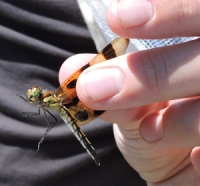Who: Well, it could be you! CRIKT is a group of non-professional scientists engaged in professional level research and monitoring. Science inquiry is led by people like you, community members who follow tight research protocols. As with all scientific research, they start with the development of a research question, move to experimental design, then data collection and analysis and finally disseminate their findings. They ask questions that are personally meaningful, study the question with intentionality and then share their findings with others. In other words, they are fully involved throughout the data cycle.
And – they laugh and have fun while they’re at it! According to Tim Vargo, Manager of Research and Community Science, “In addition to helping put together a monitoring plan, members are becoming our local experts. For example, Jon Bales likes to bring insect nets on bird walks and then he goes home with a handful of tiny beetles to which most people wouldn’t give a second thought – to identify them with a microscope”. It is extremely rare to find this kind of holistic community engagement in scientific research.
One critical question that this group is exploring is: Can insects be an effective indicator of the resilience and sustainability of the restoration work we do in our urban parks?” Which gets us to the second attribute that makes the CRIKT group unique —where they conduct their research.

Where: Urban parks — Riverside, Washington and Three Bridges to name a few. The CRIKT group conducts their research projects in areas specifically managed through adaptive restoration approaches.
Most field research stations are careful to exclude people and dogs from research sites and have limited exposure to the types of containments and hardscapes found in cities. But, CRIKT not only works toward publishable research led by community members, they also conduct their studies in an urban setting using methods that respond to these variables. This group is well positioned to measure the resilience of restored landscapes within the context of ongoing urban impacts.
The CRIKT approach has shown to have more in‐depth participation in the scientific process and the building of an invertebrate enthusiast community for the Urban Ecology Center. In a post‐project evaluation, 60% of respondents indicated they were novices and 100% were satisfied with their participation. Community scientists contributed over 250 hours to the creation of the plan.
Through this process of science inquiry, the group is making and documenting important discoveries. According to Tim, “If they weren’t looking, we wouldn’t be building up our species list and finding dragonflies that haven’t been recorded in the Milwaukee County in over 100 years! And another exciting thing about being in this group — just about anything you find is new to our lists and might be new to the County or Wisconsin. Who knows, someone might describe a species new to science – if it’s going to happen it will happen with invertebrates!
Interested in learning more about CRIKT or invertebrates? Please contact Jennifer Callaghan at This email address is being protected from spambots. You need JavaScript enabled to view it. or Tim Vargo at This email address is being protected from spambots. You need JavaScript enabled to view it.. Keep up to date with current CRIKT opportunities through the Weekly Research and Restoration email. Sign up today! Look for the "connect" tab on the right above.





